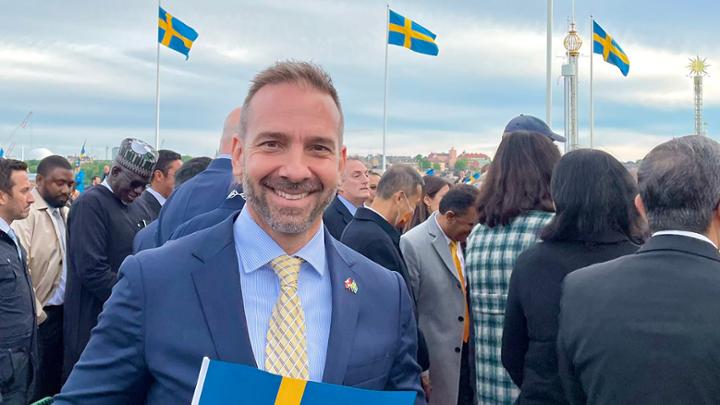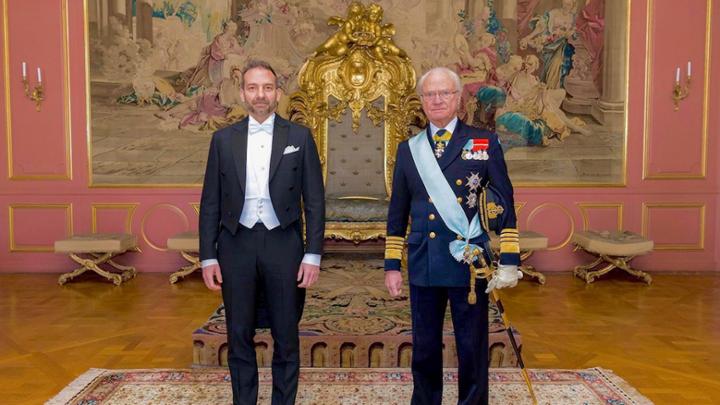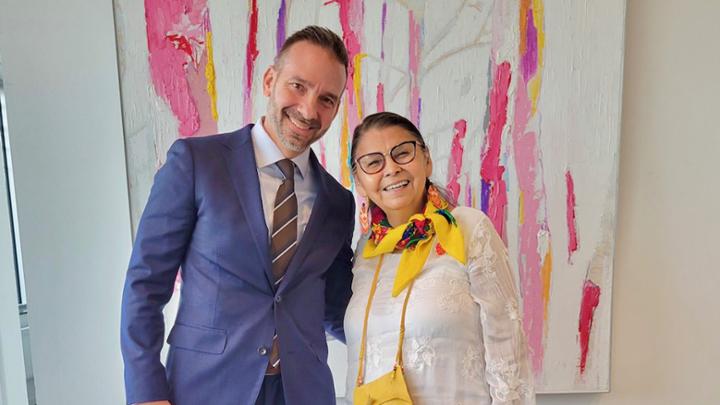Nordic state of mind
October 16, 2023

Business graduate Jason LaTorre, BCom ’95, is ambassador of Canada to Sweden, a role that might include building ties between Indigenous peoples, bolstering critical trade and defence relationships, connecting over afternoon fika, or celebrating Nobel prize winners.
LaTorre, who assumed his role in 2021, kindly answered some of our questions via email from his home in Stockholm.
What is the most challenging part of your work as an ambassador? What aspect do you enjoy the most?
The most challenging aspect of my job is determining where the embassy should focus its resources to most effectively advance Canadian government priorities and serve Canadians in Sweden. The world is becoming more complex, and the pace of change has increased rapidly. We are currently living through a period of considerable economic, security, energy and climate uncertainty. Understanding where Canada and Sweden fit into the broader global context, what we bring to the table, and how we can work together to take advantage of opportunities and overcome global risks is an ongoing challenge.
The aspect I enjoy the most is advocating for Canada, talking about what makes Canada special and securing new global opportunities for Canadians. In this regard, I especially like promoting Canada as a location of choice for foreign direct investment and for international students, and as a trusted partner for trade and innovation, for defence and security and for energy and climate action. On the last point, Canada is so well-placed right now as we possess the critical minerals, renewable energy, innovation and diverse talent to build a clean-energy economy and lead the world’s green transition. This is a very exciting moment for Canada. And helping Canada seize this moment is incredibly rewarding.

What are some changes you have seen since you’ve been in Sweden?
There have been many… But the most significant change that has impacted the work of my team has been Russia’s illegal invasion of Ukraine. Russia’s aggression has spurred Sweden to abandon its 200-year-old security policy of military non-alignment, apply to join NATO, send lethal military weapons to a conflict zone for the first time since 1939 and increased rapidly its defence spending to 2 per cent of GDP. These are unprecedented changes to Sweden’s security and defence policy and are of historic significance.
How has this affected your work and the work of the embassy?
We had to quickly tap into our network of high-level contacts, making new ones in some cases, and understand their interests and priorities, then determine where Canadian and Swedish interests align and how we can work together. We are frequently in touch with Swedish officials on our support to Ukraine, including our military, financial and humanitarian assistance. We also prioritized Sweden’s NATO accession. Canada was the first NATO ally to ratify Sweden’s accession and we continue to support Sweden throughout their accession process.
We are also pursuing opportunities to deepen our bilateral defence cooperation, strengthen our trade relationship and enhance the resilience of our global supply chains. Every day, we are working together with Swedish officials to support Ukraine and enhance our trans-Atlantic security and economic partnership.
How did your Gustavson experience at UVic lay the foundation for this work?
Diplomacy is ultimately about relationships. My specialization in international business at Gustavson helped build my confidence and skills to foster cross-border relationships. The courses I took in international marketing and finance, combined with my exchange program to Kobe, Japan and my international co-op program enabled me to really understand how culture, language and history shape behaviours and customs and how to be more effective in different cultural contexts. Also, the courses I took in cross-cultural management have helped me effectively lead culturally diverse teams in Ottawa, Singapore, Ho Chi Minh City, Washington, DC and now in Stockholm.
As a student, you participated in an exchange with Kobe, Japan—how did this time shape you?
I am a strong proponent of exchange programs in large part because of my positive experience with the Gustavson exchange program to Kobe. Today, in our increasingly connected and complex global environment, an exchange program contributes so much to your overall university education and experience.
You are working to build closer connections between the Indigenous people in Sweden, known as the Sami, and Indigenous peoples in Canada. Can you tell us more about this work?
There are about 20,000 Sami in Sweden. My team and I have organized events to support the further revitalization of Indigenous languages and cultures, both in Canada and in Sweden. This has included supporting many visits of Indigenous writers, artists and performers from Canada to Sweden.
One visit that is particularly memorable was the visit of Geraldine Shingoose, a residential school survivor. Sweden has recently launched a Truth Commission for the Sami and the embassy was asked by the Stockholm Sami Association to speak about Canada’s Truth and Reconciliation Commission at an event they were hosting. Instead of doing this ourselves, we thought it would be more powerful to invite an Indigenous leader from Canada who had first-hand experience. In addition to meeting with the Stockholm Sami Association, Ms. Shingoose also met with the Chair of the Sweden Truth Commission. She described her nine years at a residential school and her interactions with Canada’s Truth and Reconciliation Commission. Her stories of courage, resilience and healing deeply moved all of us. Some Canadian media outlets have since featured Ms. Shingoose’s visit to Sweden and there is a good article about it in the Globe and Mail that you can find with a quick search.

What food or custom or drink from Sweden would you like to bring back to Canada?
My favourite Swedish custom is known as fika, which is essentially going out for a coffee and a pastry with a friend or a colleague. But it’s so much more than that. Beyond the coffee itself, there are two aspects of this cultural phenomenon that make it unique: first, it’s the seasonal pastry. Every season has its own special pastry and there are even some days that celebrate a particular pastry, like cinnamon bun day on Oct. 4 or waffle day on March 24.
The second aspect of fika that makes it particularly special is the social aspect. It’s a time to talk. If you go into a coffee shop around 2:30 p.m. in Sweden, you will see that almost everyone is engaged in conversation; no one is on their phones. It’s remarkable. It’s a break from a busy day that promotes wellbeing, mental health, productivity, and innovation. We really need to adopt fika in Canada!
You have mentioned that Sweden and Canada share a lot in common. What is one thing that especially stands out?
There’s a lot to choose from… we really are similar in so many ways, from our progressive societies to our strong public welfare systems, including universal health care, to our common business cultures, to our shared love of IKEA.
I guess the one thing that really stands out is that Swedes enjoy outdoor activities, no matter what the weather. This reminds me a lot of Canadians. Canadians and Swedes take advantage of the outdoors in every season. When it first starts to warm up in the spring, Swedes rush outside to be on restaurant patios with friends or to be out on the water kayaking, swimming, or laying out in the sun. Sound familiar?
You played rugby at UVic. What sports do you participate in or watch these days?
Sports and fitness are a big part of my life and no matter where I go, I like to exercise, play sports and get to know local professional teams. You can learn so much about a country through the sports that are popular and talking about sports is a great way to connect with someone. Of course, hockey may come to mind when you think of Sweden, but what many people may not know is that Swedes are also very passionate about their soccer teams!
I cheer for a Stockholm-based soccer team called Hammarby and have been fortunate to go to many games over the past two years. I love the energy and excitement in the stadium, the songs, the flares, the waving flags. It’s incredible. In addition to being something that I truly enjoy and look forward to outside of the embassy, I have also been able to form stronger bonds with a few Swedish government officials and business leaders over our shared admiration for Hammarby. Even with those who support other teams, soccer has become a fun way for me to banter with others and form a closer personal connection.
What kinds of reasons bring Canadians to your office in Sweden?
At the embassy, we focus on two main areas: we work to advance Canadian government priorities through diplomacy and advocacy, and we serve Canadians in Sweden. So, for example, Canadian tourists can contact our Consular team for help in a medical emergency, assistance to contact local authorities, support to receive information about local laws and regulations, or help to replace lost or stolen passports. Canadians living in Sweden reach out to us for a variety of services such as renewing their passports or applying for citizenship certificates. Our Consular team in Stockholm serves hundreds of Canadians every year.
Canadian businesses come to our trade team when they want advice, market intelligence or contacts to help them export to, or do business in Sweden. Our trade commissioner service team at the embassy serves Canadian firms of all sizes every single day. We call Canadian firms our “clients,” and we have helped them win export deals, establish R&D and innovation agreements and form important business partnerships.
Finally, we support many Canadian cultural leaders, political leaders and senior government officials who are engaging with their Swedish counterparts on important issues, such as climate action, energy security, environmental protection, defence and security cooperation, promoting democracy and human rights, advocating for inclusive trade and supporting Ukraine. Canada’s PM, Deputy Prime Minister, Minister of Foreign Affairs, Minister of Defence, Minister of Environment, Minister of Industry, and so many others have had interactions with their Swedish counterparts over the past 18 months. My team and I have supported all these engagements, among so many others, by providing advice, insight, intelligence and logistical support. It’s been a busy period!
How else can the community at UVic learn about the life of an ambassador?
The Global Affairs Canada website has some really good information about what we do at our embassies around the world and about our foreign policy priorities. You can also learn more about how to apply for the foreign service at that site.
I would encourage UVic students to think about a rewarding career in Canada’s foreign service. It is important that our foreign service is representative of Canada, one of the world’s most diverse countries. We need a highly skilled, multilingual, diverse and respectful workforce that takes pride in delivering timely and high-quality services to Canadians and advances Canada’s national interests.
If you are interested in what an average day looks like for me, I post often on X and on LinkedIn about meetings, events and the fun things that I get to do on a day-to-day basis as Canada’s Ambassador to Sweden.
—Jenny Manzer, BA ’97
